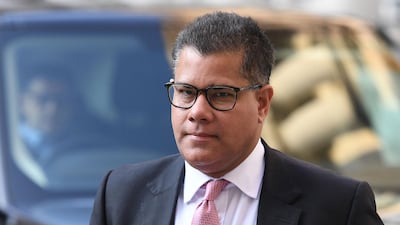The chief organiser of this year's Cop26 climate change summit issued a global call to arms on Tuesday – as experts fear environmental gains made during the pandemic will quickly be lost.
Alok Sharma, president of the event, which will be held in Glasgow in November, warned of the destruction that will be unleashed if the world fails to tackle rising temperatures.
Speaking at Abu Dhabi Sustainability Week Summit, Mr Sharma said that choices made today would determine the world's fate.
He called on world leaders to set ambitious targets, phase out fossil fuel subsidies, use renewables and embrace clean public transport.
"It is vital we act now," said Mr Sharma, a former British minister who continues to serve in Boris Johnson's Cabinet.
“I urge businesses, cities and regions to take action in the race to zero campaign,” he said, referring to commitments to achieve net zero carbon emissions by 2050.
The world faces a critical year in the battle against climate change and Cop26 have been described as the most important summit since Paris in 2015.
Agreed in 2015 and now signed by 195 countries including the UAE, the Paris deal aims to limit global average temperature increase to 1.5°C above pre-industrial levels. But experts warned the world faces increases of more than 1.5°C within 10 years if countries fail to act.
Emissions fell worldwide last year as many countries implemented lockdowns. But experts predict that the reductions won’t last. On the sidelines of the summit however, the head of the International Renewable Energy Agency said Covid-19 marked the turning point in the worldwide embrace of renewable energy.
Francesco La Camera said the switch was crucial in the fight against both the coronavirus pandemic and climate change. He called for coal-fired power plants to be phased out immediately and urged that all global fossil fuel subsidies – at $450 billion a year and 70 per cent of all energy subsidies – be moved to renewables.
About 90 per cent of new electricity generation last year was renewable, putting green electricity generation on track to eclipse coal within a few years.
“This is the best way to respond to the pandemic,” he said.
Cop26 was postponed in 2020 due to the pandemic, but Mr La Camera argued that the lost year could be framed positively in the context of new global commitments. China said in September that it would aim to be carbon neutral by 2060, following the EU and UK.
Joe Biden's election in the United States also means the US is back among the countries committed to reversing climate change.
The UN estimates that more than 110 countries have now set net zero targets, representing more than 65 per cent of global emissions.
“This year is the turning point – we can accelerate on a path that was already there,” said Mr La Camera.
Abdullah Al Nuaimi, the UAE's Minister of Climate Change and Environment, said international collaboration was important for the talks to succeed and the UAE was dedicated to accelerating its transition to a green economy as part of its Covid-19 recovery plans.

"We have moved forward with our renewables projects [and] launched the first reactor of the Barakah Nuclear Energy Plant," he said.
The UAE has also pledged to increase clean power capacity – including solar and nuclear – to 14 gigawatts by 2030 from 125 megawatts in 2015.
"We also committed to reducing our greenhouse gas emissions by 23.5 per cent compared to business as usual for the year 2030," he said. This translates into emission reductions of about 70 million tonnes.
Nawal Al Hosany, the UAE's permanent representative to Irena, said the climate change fight was winnable.
“There is no way [we would] come out of the pandemic and not learn lessons,” she said.
“We are hoping to achieve our targets and understand that behaviour has consequences.”
Countries at the climate change summit are expected to deliver more ambitious domestic plans for cutting greenhouse gases by 2030, as current proposals are not enough to prevent dangerous temperature rises.
The Abu Dhabi Sustainability Week runs until Thursday and is being held online because of the coronavirus pandemic.












